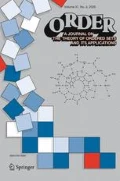Abstract
The smallest finitely based semigroup currently known to generate a variety with continuum many subvarieties is of order seven. The present article introduces a new example of order six and comments on the possibility of the existence of a smaller example. It is shown that if such an example exists, then up to isomorphism and anti-isomorphism, it must be a unique monoid of order five.
Similar content being viewed by others
References
Birjukov, A.P.: Varieties of idempotent semigroups. Algebra Logic 9, 153–164 (1970); Translation of Algebra i Logika 9, 255–273 (1970)
Burris, S., Sankappanavar, H.P.: A Course in Universal Algebra. Springer, New York (1981)
Edmunds, C.C.: On certain finitely based varieties of semigroups. Semigroup Forum 15, 21–39 (1977)
Edmunds, C.C.: Varieties generated by of semigroups of order four. Semigroup Forum 21, 67–81 (1980)
Fennemore, C.F.: All varieties of bands. Semigroup Forum 1, 172–179 (1970)
Gerhard, J.A.: The lattice of equational classes of idempotent semigroups. J. Algebra 15, 195–224 (1970)
Jackson, M.: Finite semigroups whose varieties have uncountably many subvarieties. J. Algebra 228, 512–535 (2000)
Lee, E.W.H.: Identity bases for some non-exact varieties. Semigroup Forum 68, 445–457 (2004)
Lee, E.W.H.: Minimal semigroups generating varieties with complex subvariety lattices. Int. J. Algebra Comput. 17, 1553–1572 (2007)
Lee, E.W.H.: Combinatorial Rees–Sushkevich varieties are finitely based. Int. J. Algebra Comput. 18, 957–978 (2008)
Lee, E.W.H.: Hereditarily finitely based monoids of extensive transformations. Algebra Univers. 61, 31–58 (2009)
Lee, E.W.H., Li, J.R.: Minimal non-finitely based monoids. (submitted)
Lee, E.W.H., Volkov, M.V.: Limit varieties generated by completely 0-simple semigroups. (submitted)
Murskiĭ, V.L.: The existence in the three-valued logic of a closed class with a finite basis having no finite complete system of identities. Sov. Math., Dokl. 6, 1020–1024 (1965); Translation of Dokl. Akad. Nauk SSSR 163, 815–818 (1965)
Oates, S., Powell, M.B.: Identical relations in finite groups. J. Algebra 1, 11–39 (1964)
Oates-Williams, S.: On the variety generated by Murskiĭ’s algebra. Algebra Univers. 18, 175–177 (1984)
Perkins, P.: Bases for equational theories of semigroups. J. Algebra 11, 298–314 (1969)
Petrich, M., Reilly, N.R.: Completely Regular Semigroups. Wiley, New York (1999)
Pickert, G.: Zur Übertragung der Kettensätze. Math. Ann. 121, 100–102 (1949) (in German)
Plemmons, R.J.: There are 15973 semigroups of order 6. Math. Algorithms 2, 2–17 (1967)
Pollák, G.: On two classes of hereditarily finitely based semigroup identities. Semigroup Forum 25, 9–33 (1982)
Rasin, V.V.: Varieties of orthodox Clifford semigroups. Soviet Math. (Iz. VUZ) 26(11), 107–110 (1982); Translation of Izv. Vyssh. Uchebn. Zaved. Mat. 11, 82–85 (1982)
Sapir, M.V.: Problems of Burnside type and the finite basis property in varieties of semigroups, Math. USSR-Izv. 30(2), 295–314 (1988); Translation of Izv. Akad. Nauk SSSR Ser. Mat. 51(2), 319–340 (1987)
Sapir, O.: Finitely based words. Int. J. Algebra Comput. 10, 457–480 (2000)
Sloane, N.J.A.: The On-line Encyclopedia of Integer Sequences. Published electronically at http://www.research.att.com/~njas/sequences
Tishchenko, A.V.: The finiteness of a base of identities for five-element monoids. Semigroup Forum 20, 171–186 (1980)
Trahtman, A.N.: A six-element semigroup that generates a variety with a continuum of subvarieties. Ural. Gos. Univ. Mat. Zap. 14(3), 138–143 (1988) (in Russian)
Volkov, M.V.: The finite basis question for varieties of semigroups. Math. Notes 45(3), 187–194 (1989); Translation of Mat. Zametki 45(3), 12–23 (1989)
Volkov, M.V.: Semigroup varieties with a modular lattice of subvarieties. Russian Acad. Sci. Dokl. Math. 46(2), 274–278 (1993); Translation of Dokl. Akad. Nauk 326(3), 409–413 (1992)
Author information
Authors and Affiliations
Corresponding author
Additional information
Dedicated to Professor Norman R. Reilly on the occasion of his 70th birthday.
Rights and permissions
About this article
Cite this article
Edmunds, C.C., Lee, E.W.H. & Lee, K.W.K. Small Semigroups Generating Varieties with Continuum Many Subvarieties. Order 27, 83–100 (2010). https://doi.org/10.1007/s11083-010-9142-8
Received:
Accepted:
Published:
Issue Date:
DOI: https://doi.org/10.1007/s11083-010-9142-8


